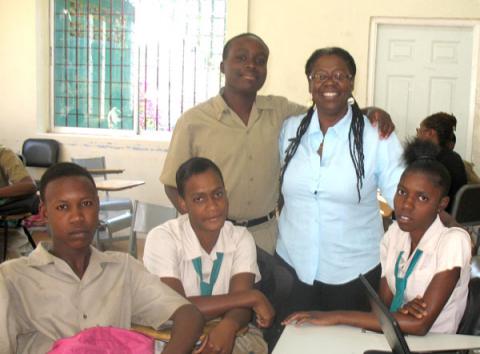
Presented by Vilma Gregory and Michelle Bond
February 2010
This is a follow-up activity to earlier mentorship efforts made by other past students.
1. What does the XLCR Student Mentorship Programme aim to achieve?
· Increased teacher and school support
· Improved student attitudes, values and self-esteem
· Improved student performance, retention on a per form/subject/individual basis
· Increased alumni participation in the school’s welfare
· Positive and measurable impact on students and the school
2. Why XLCR Student Mentorship Programme?
· Provide student Mentees with greater self confidence
· Prepare student Mentees for the future workforce
· Give Mentors an opportunity to give back to the school
· Give Mentors an opportunity to impact the community
· Help in the joint effort to re-build the school
3. Who will participate in XLCR Student Mentorship Programme?
· Collaboration with Form Teachers, Dean of Discipline and Principal
· Supported and manned by Volunteer Mentors from the XLCR Past Students’ Association who are linked to the corporate sector and to various community and service organisations
· Mentors expected to provide support and guidance and should be the following: reliable, available, good communicators, non-judgemental, willing to lead and lacking a criminal record.
· Selection of twenty-six (26) “troubled” student Mentees to be done by the Principal and Dean of Discipline
· Selection of approximately four-hundred (400) student Mentees from Grade 7 to be done with Form Teachers and matching of Mentors to be done using cluster approach
· Any other special need student e.g. in Grade 11 will be supported based on available resources
4. How will XLCR Student Mentorship Programme be delivered?
· Starts with belief in Youth and their possibilities
· One-on-one Mentee support for “troubled” students
· Group/cluster Mentee approach for “troubled” students and all Grade 7 students
· E-Mentoring support where computer access is available- using social media and e-mail
· Orientation of Mentors on shared vision and suggested approaches to implement
· Creation of positive relationships with Mentees with Mentors providing positive role models
· Re-inforcement of positive values and attitudes and transfer of social skills to Mentees
· Encouragement of Mentees to express themselves and to build trust with Mentors
· Initial matching of Mentors/Mentees to be done randomly until patterns emerge
· Selection of Subject Mentors/Tutors to guide curriculum subject areas when Expert Mentors available e.g. specialist in Foreign Languages
· Formal evaluation of programme to be done in an on-going manner for impact measurement
5. When will XLCR Student Mentorship take place?
· Starting February 2010, the “troubled” 26 student Mentees will participate in a pilot cluster approach
· Starting March 2010, all Volunteer Mentors will be invited to an Orientation session, with a view to starting the Grade 7 Mentorship sessions by March 22, 2010
· Each session will last for 45 mins with 15 mins dedicated to Values and Attitudes and 30 mins. to break-out cluster + one-on-one Mentee sessions
· The Grade 7 follow up is expected to last for 4 years until they graduate from Grade 11
Phase I: February 2010 Mentorship with 26 students
· Share preliminary Mentorship programme with Mentors and Dean/Principal
· Talk to Dean of Discipline re class list, schedule and mentorship programme being proposed
· Talk to Guidance counsellor re any special needs of the students
· Meet teachers of 26 students and share programme and get ideas
· Negotiate meeting the 26 students every other week
· E-mentoring: Set up online Mentors private network for sharing documents and feedback on 26 students- invite Dean and Principal to join and give feedback
· E-mentoring: Set up five online Mentees networks for clusters of students (not more than 6 to 2 mentors with one observing as silent partner and one interacting)
· Identify computer lab time for Mentees to use online network
· Do Mentorship training and orientation once programme signed off…post session documentation key and should be done in 48 hours and shared with other mentors so lessons may be shared
· Share lessons from 2008-2009 mentorship experiences with other new mentors
· Structure 45 mins sessions as follows:
o Warm up with 8 ins on Values /Attitudes –select topics beforehand and make them actionable e.g. “Do not cover mouth while talking” and “ Keep eye contact for good body language”.
o Then 30 mins of breakout sessions in clusters with group assignments while Mentors do one-on-one updates from mentees who express themselves in no more than 5 mins each…give practical assignments to match the students’ needs and document these
o Each mentor ends with 5 mins group motivation session per cluster
o End session with entire class re-inforcing new Values and Attitudes in 2 mins
· Plan for impact measurement on students’ attitude, attendance, performance and subject retention
· Get student records from Principal /Dean of Discipline on a monthly basis














Comments
Project updates
We should highlight 2 projects from each year-2011-2015.Just an idea for updates
Add new comment